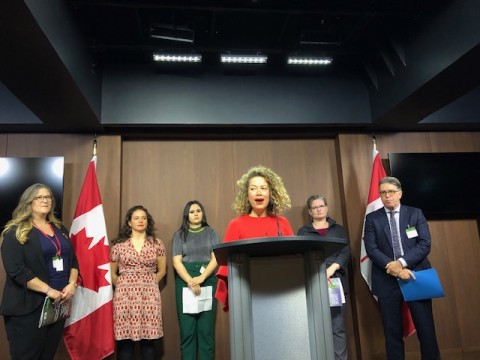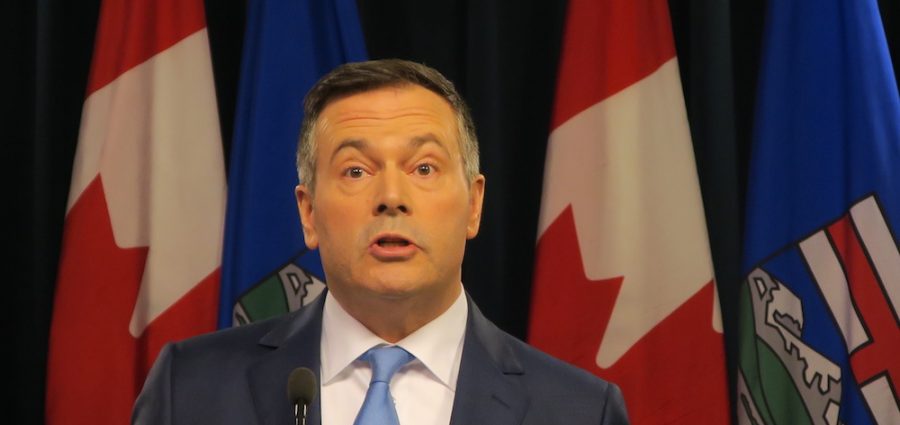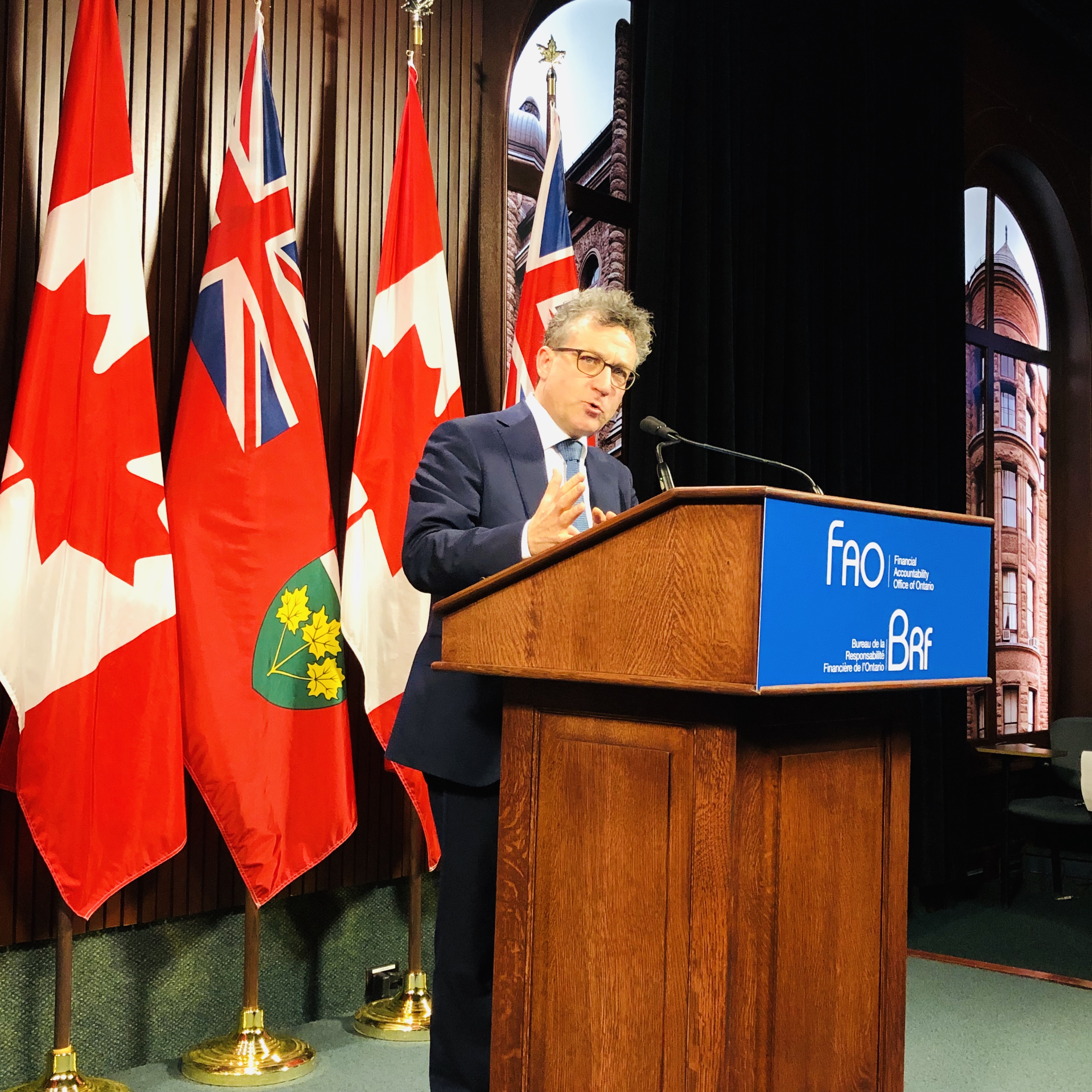10 mars 2020

Here is this month's tax fairness news (sign up to receive our monthly newsletter)
Photo: Catherine Abreu, Executive Director of Climate Action Network Canada, speaks to reporters at a press conference this week on Parliament Hill, where Canadians for Tax Fairness joined more than half a dozen organizations to urge the government to invest in a more sustainable economy.
By Erika Beauchesne
10 March 2020
Canadians for Tax Fairness, NGOs call for climate action in Budget 2020
Canadians for Tax Fairness and more than half a dozen groups representing labour, environmental and Indigenous rights called on the federal government this week to scale up investments to move Canada to a green economy.
Ahead of Budget 2020, which Finance Minister Bill Morneau said would focus on the environment, the organizations held a press conference on Parliament Hill to underline the urgency of financing climate action.
Canada should seize this opportunity to transform how it uses energy, builds communities, and creates employment, the groups recommended. Continuing to divert billions in fossil fuel subsidies would be morally and financially unethical, they said.
Earlier this winter, C4TF and supporters also wrote to Minister Morneau to demand Canada remove fossil fuel subsidies and unfair tax loopholes, which would not only make the tax system fairer, but together provide more than $18 billion in revenues to fund Just Transition measures.
As Canada struggles with low oil prices and the looming threat of a global recession due to the Coronavirus outbreak, the government has an urgent responsibility to build a more sustainable economy, C4TF director Toby Sanger said at the press conference, emphasizing how Canada can fund climate justice with tax justice.
The press conference also heard from representatives with Environmental Defence, Climate Action Network Canada, the Canadian Union of Postal Workers, Citizens for Public Justice, Indigenous Climate Action, and Unifor.

International Women’s Day campaign highlights how to make taxes work for women
This Women’s Day, C4TF and tax justice allies called on governments around the globe to fix tax policies that negatively affect women and girls.
The Global Alliance for Tax Justice spearheads the annual campaign to Make Taxes Work For Women, which runs from March 8 to 20 and raises awareness of the links between fair taxes and gender equality.
Check out our Women’s Day piece exploring how Canada can be much more ambitious in reshaping fiscal policies with women in mind. Closing sexist tax loopholes that primarily benefit men, investing in childcare and public services that support women, and ensuring lower-income women receive tax benefits are just some of the ways we can improve gender equality through the tax system.
We also encourage you to read and share the many other important Women’s Day contributions from allies and supporters.
Oxfam’s Annual Feminist Scorecard outlines how the federal government could advance equality by closing tax loopholes and ensuring corporations pay their fair share. An op-ed by the Independent Commission on International Corporate Tax Reform (ICRICT) looks at how progressive tax reforms can enhance equality across the globe. And this post from the Canadian Centre for Policy Alternatives examines many additional solutions to the barriers still standing in the way of gender equality.

Alberta Premier Jason Kenney’s latest budget banks on a resurgence of oil prices and continues to cut important public services. Photo: David Climenhaga, Alberta Politics
Provincial budgets: Alberta makes damaging cuts to fund corporate taxes; B.C. eyes higher revenues—and higher economic growth—with progressive reforms
Budgets tabled recently by provincial neighbours BC and Alberta present starkly different approaches—and outcomes.
The budget tabled by Jason Kenney’s United Conservative Party in Alberta makes damaging cuts to public services to fund the $4.5 billion corporate tax cut they announced last year.
The budget doubles-down on austerity measures announced last year, with cuts of over 1,400 full-time public sector positions this year alone. Within days, the province’s largest trades-based institution, the Northern Alberta Institute of Technology, announced it was cutting up to 9% of its staff in response to the cuts.
Kenney is also cutting housing and children’s services, including eliminating the Alberta Child Benefit, which had reduced child poverty rates by half during the NDP’s tenure.
Cutting essential programs for communities in need makes a difficult situation worse. A recent study by Public Interest Alberta and other advocacy groups showed reduced spending on social programs has the hardest impact on the poorest families, especially single-mother households.
By drawing resources away from childcare, the UCP has also missed an opportunity to bolster employment, especially women’s participation in the workforce, as a recent column in the Globe and Mail points out.
But even these cuts aren’t enough to balance the budget and make up for the revenue losses from cutting corporate taxes. The budget includes assumptions for oil prices, economic growth and revenue growth that are so far above any private sector forecasts that they’ve been described as “magical thinking.” This is even more the case with the recent plummet in oil prices and downturn in the economy.
The projections are reminiscent of Kenney’s claims last year that his corporate tax cuts would would create 50,000 full-time jobs. Instead, the province has suffered a loss of almost 50,000 full-time jobs in the six months since the corporate tax cuts were introduced.
As the Alberta budget itself shows, the province would have at least $14 billion more in annual revenues if it had similar tax rates as other provinces. And when the Globe and Mail publishes an editorial calling on Alberta to consider increasing taxes instead of cutting spending, it’s a sign that the UCP’s budget is even too extreme for the conservative press.
It’s a completely different story right next door to Alberta, where the NDP government in British Columbia has demonstrated with their budget how they can make the tax system more progressive, invest more in public services, balance the budget and have a strong economy at the same time.
The B.C. budget increased funding for childcare, education, affordable housing, health care, infrastructure and climate action, while reducing taxes for lower incomes and running another surplus.
The B.C. NDP has been able to do this by increasing taxes on corporations, on top incomes and on real estate speculators. This budget includes a new tax on the top one percent which is expected to raise more than $200 million in revenue, and a sales tax on digital services.
With these progressive policies, B.C. has had the strongest growth and lowest unemployment rate among provinces for the past two years, and private forecasters expect it to continue top all provinces with the strongest economic growth and lowest jobless rate for the next two years as well.

Coalition underlines risks of corporate secrecy at money laundering inquiry
Canadians for Tax Fairness and coalition members highlighted how weak transparency laws have contributed to Canada’s ‘snow-washing’ problem at B.C.’s public inquiry into money laundering.
The Cullen Commission invited testimony from coalition members including Canadians for Tax Fairness, Transparency International Canada and Publish What You Pay Canada.
TI Canada director James Cohen told the inquiry how Canada’s lack of public information on beneficial owners --the true owners behind a company—has enabled financial crime and tax avoidance in Canada.
B.C. launched its public inquiry into money laundering after multiple reports and experts estimate that over $7 billion in criminal proceeds and “dirty money” is being laundered through real estate and casinos in B.C.
The federal government agreed to consult with the provinces on a public registry of beneficial ownership to combat money laundering, but without a pan-Canadian accessible registry in place, criminals can continue to hide their money behind anonymous companies.
Advocates, law enforcement and industry representatives have also recently urged the government to act. Last week, the head of the Ontario Real Estate Association called for a public registry of beneficial owners for property to counter the influx of ‘snow washing’ from B.C., which recently tightened laws to clamp down on money laundering.
Lack of beneficial ownership transparency was cited as one of the areas where Canada has fallen behind its peers in the Financial Secrecy Index released last month. The global index, which is compiled every two years by the Tax Justice Network, placed Canada 19th, noting the country’s lack of public beneficial ownership information as well as requirements for public reporting of financial and tax information by multinationals.
The Cullen Commission into money laundering resumes later this spring. You can read our press release and joint statement to the commission here.

Radio-Canada journalist Louis Blouin, left, speaks with Canadians for Tax Fairness director Toby Sanger, right, about the broadcaster’s recent investigation into government advertising with online giants. An international solution to address the digital economy could fail to materialize.
Canadian need for digital tax grows as OECD solution appears less promising:
A recent Radio-Canada investigation revealed that the federal government spends four times as much advertising money on foreign e-commerce giants Facebook and Google—that pay little or no tax in Canada—than it does on domestic platforms.
In a video interview, C4TF director Toby Sanger told the broadcaster how unfair tax rules for foreign digital corporations hurt Canada several ways, resulting not only in lost revenues from sales and income taxes, but also a tax advantage for foreign corporations over domestic producers and media companies.
Canada’s Heritage Minister recently told iPolitics that Budget 2020 could see the government bring in a sales tax on digital services. This long overdue policy is but one measure Canada needs to take to ensure foreign online giants pay their fair share of different taxes.
The latest OECD proposals to reform international corporate tax rules would unfortunately do little to eliminate income tax dodging by large multinational corporations.
The proposal would redistribute minimal taxing rights to jurisdictions where companies have customers, leaving higher-income countries to benefit more than lower ones, said the Independent Commission for the Reform of International Corporate Taxation in a release.
While the government waits for a consensus from the OECD that may fail to rein in online giants, other countries have announced plans to introduce digital services taxes on companies such as Google and Facebook. As Budget 2020 nears, Canada has an opportunity to level the digital playing field as well.

A Cayman Islands beach. The British overseas territory made the EU’s tax haven blacklist.
Cayman Islands lands on EU tax haven blacklist
The EU has updated its ‘blacklist’ of tax havens to include the Cayman Islands, Panama, and the Seychelles.
Oxfam has long called for the EU to strengthen its blacklist criteria. In a release, the group said it was encouraging to see the Cayman Islands finally recognized but argued the updated list had let other havens off the hook, including the Bahamas, British Virgin Islands and Bermuda.
As we highlighted last year, the Cayman Islands are among the hottest offshore destinations for Canadian corporate cash, according to the most recent foreign direct investment figures from Statistics Canada.
Canadian companies reported $40 billion in the Cayman Islands and $6.7 billion in Panama in 2018.
While the EU tax haven list is but one approach to name and shame tax havens, tougher regulations are needed here at home and internationally to tackle offshore tax avoidance and punish tax dodgers alongside their enablers.

Ontario’s Financial Accountability Officer Peter Weltman. Photo: FAO
Time for Ontario for review tax expenditures: Financial Accountability Office
Ontario’s Financial Accountability Office released a report last month showing the province’s 149 tax expenditures are projected to cost over $44 billion and that their cost has been rising far faster than program spending. The FAO cautioned that if the cost were identified separately in the budget, tax expenditure spending would be the second highest expense sector behind only health, and called for them to be reviewed.
While the Ontario government has been expanding tax expenditures and loopholes, it has been cutting program spending in education, social services and health care.
The report also looked at how the 12 costliest expenditures benefited Ontario families and found 43% of benefits went to families with higher incomes.
Research by the CCPA on federal tax expenditures came to a similar conclusion – the majority benefited the wealthy and men over women.
Canadians for Tax Fairness has long called for federal and provincial governments to eliminate regressive and ineffective tax loopholes, like the stock option deduction. The federal Liberal government has agreed to undertake another review of federal tax expenditures and to make it public this time. We’ve called for full public consultations and for the government to be far more ambitious about the review's scope and how much revenue they could gain from it.